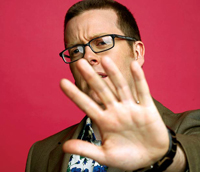No Laughing matter? Frankie Boyle again courts controversy over tweets about Angelina Jolie
Posted by Dr John Jewell

In October 2012, the comedian Frankie Boyle was ensconced at the high court in London where he sued the Daily Mirror for libel. In July 2011 the paper published an article which which described him as a ‘racist comedian’. Boyle argued that he has been seriously libeled and that whilst he did not mind being criticized, he objected strongly to being accused of racism. Mirror Group Newspapers for their part defended the original article vigourously. Their QC, Ronald Thwaites, argued, ‘What he has done is to take the negative stereotype of black people and exploit that for cheap laughs gratuitously. This is not part of some intellectual cause. This is not part of some clever message’. Happily for Boyle, the jury decided that he was not a racist and he was awarded £50,400 in damages.
On one level it’s interesting that Boyle should be so offended by the Mirror’s article that he is moved to the law. This is a man, we should remember, who has latterly fashioned his career out of being offensive. His remarks about Katie Price disabled son Harvey attracted widespread opprobrium – his twitter feed was festooned, recently, with one liners and observations about paedophilia and the Jimmy Savile affair. Now, there are the ‘jokes’ about Angelina Jolie.
Of course Boyle polarises opinion – to some he is a sick, humourless bully who attacks those that cannot defend themselves. To others he is at the vanguard of popular comedy saying the unsayable in an age when the values of free speech are undermined almost daily.
So should there be limits to humour? Do Boyle, Jimmy Carr and the like have the right to joke about any subject they wish?
Firstly, whether or not something is funny is an entirely subjective concept. There are many people who can argue with eloquence that certain subjects should never be off limits because comedy helps us understand the tragedy of the human condition. That laughing about cancer or child abuse is a necessary activity in a functioning and healthy democracy. Others may argue, as does writer JF Derry, that jokes about rape, for example, are unacceptable in any form. ‘There are no good rape jokes’, he has written, ‘None that make the subject any funnier than the horrid reality that it is for any rape victim.’
But what is inescapable is the importance of comedy and humour. We must analyse humour and the impact that it has on society, on individuals, on behaviour patterns, on popular culture. In this sense, analysis can tell us about ourselves and the times we live in. Lockyer and Pickering in You Must be Joking: the Sociological Critique of Humour state that humour is far from a joking matter: in certain contexts it can injure people’s social standing, or cut deeply into relationships and interaction between people within and across different social groups.
So the jokes and asides of Jimmy Carr, who has pondered whether the rape of prostitute constitutes shop lifting, are far from insignificant. They can be seen to contribute to the perpetuation of certain myths and ideas.
As to whether comedians have the right to joke about whatever they wish, that particular issue is far more complex. As the comic Liam Mallone has pointed out, whatever he says on stage, he is extremely unlikely to attract the attention of the police. Should he decide to communicate material online, though, then he may find himself falling foul of the 2003 Communications Act which invites anyone aggrieved by what they see to make a legal complaint. What we have here is the difference between free speech (made to a ‘live’ audience) and free expression (communication through the press, television and now the internet). As the academic Paul Sturges has pointed out – what has been accepted in free speech has always tended to be much broader than in free expression via media.
We live in a Britain now where teenager Matthew Woods was imprisoned for three months for making “grossly offensive” comments on social networking sites about the disappearance of April Jones. A Britain where the police served a harassment order on a teenager who used twitter to inform Olympic diver Tom Daley that Daley had let his late Dad down by performing poorly during the Olympics. Such events prompted the journalist Mic Wright to ask in the Daily Telegraph whether Boyle should close his own twitter account for fear of arrest.
Wright raises other important issues: Woods’ idiotic post was to a very small audience, Boyle tweets to a following of over one million. Is it Boyle’s fame or profession as a comedian that protects him from the law?
But do we really want a society where people can be prosecuted and criminalised for insensitivity and causing offence? It must be that the right to offend goes hand in hand with the freedom to be offended? Or does the general public need to be protected from cruel humour which can actually reinforce certain myths and stereotypes?
To my mind, censoring comedians would be a wholly retrogressive step. We know what we are going to get from Frankie Boyle – to get to his twitter page requires personal agency: we are choosing to enter his world. We should recognise the power of humour, for sure and criticise those who hold views abhorrent to our own – but the maxim of Orwell still holds true: if liberty means anything at all, it is the right to tell people what they don’t want to hear.

